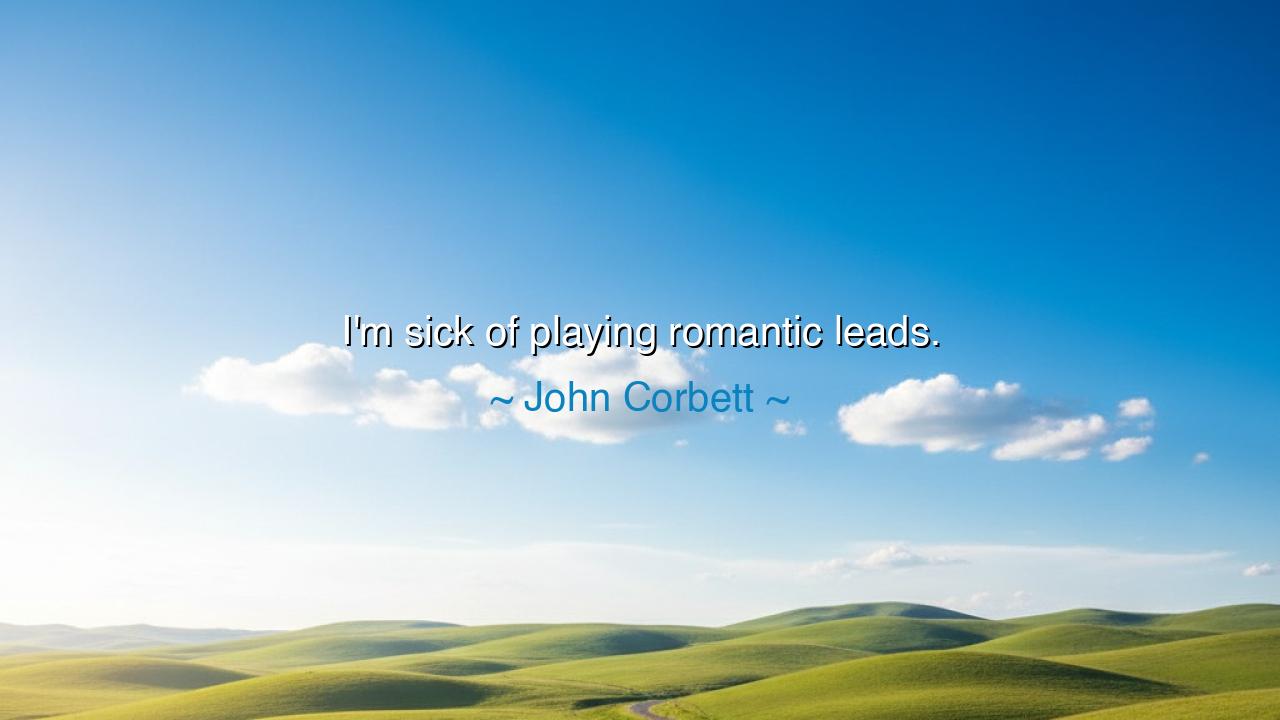
I'm sick of playing romantic leads.






Hear now, O seekers of wisdom, the words of John Corbett, a man who, with straightforward clarity, speaks of his weariness with the role he has often played: "I'm sick of playing romantic leads." In this simple statement lies a profound reflection on the nature of identity, expectation, and the longing for authenticity. To be cast in the mold of the romantic lead is, in many ways, to be trapped within a role—an identity that is defined by the whims of society, audiences, and the desires of those who seek comfort in the idealized notion of love. Yet, as Corbett reveals, there comes a time when even the most flattering of roles becomes a burden, when the expectation of being the object of romantic desire no longer aligns with one’s true self.
In the ancient world, heroes were often bound by the roles that fate or society imposed upon them. Take the story of Achilles, whose prowess in battle was his destiny, yet this very role led him into an existential struggle. Achilles, though a great warrior, yearned for something deeper than the glory of battle—he sought peace and a legacy that transcended the bloodshed. His great conflict, as it unfolded in the Iliad, was not merely with his enemies but with the role he had been cast into by the gods and the expectations of those around him. The desire for freedom from the constant cycle of war mirrors Corbett’s own yearning to break free from the repetitive role of the romantic lead. Achilles, like Corbett, sought something more than what others had defined for him.
In the world of cinema and storytelling, the romantic lead is often a figure of idealized love—the perfect partner, the one who can solve problems, offer salvation, and embody the aspirations of the audience. But what happens when this ideal becomes a constraint? When the role of the romantic hero no longer serves the true self, but becomes an expectation that stifles growth, expression, and authenticity? Corbett’s frustration with the romantic lead speaks to the larger tension that many face when their identity is shaped by roles that do not align with their deeper desires or personal journey. It is a call for self-empowerment, a plea to break free from the labels imposed by others and to seek roles that are more aligned with one's true nature.
Consider the story of Oedipus, a king who, despite his wisdom, was fated to play a role that he could not escape. He was bound by the oracle’s prophecy, destined to kill his father and marry his mother. Though Oedipus sought to avoid his fate, he found himself trapped within the very identity that was thrust upon him. His story is one of tragic realization—he could not escape the role that had been defined for him by fate and the gods. The frustration Corbett feels with the romantic lead mirrors this ancient conflict—when one is forced into a role that no longer resonates with the soul, the desire for freedom and authenticity becomes a powerful and necessary force.
The lesson in Corbett’s words is clear: there comes a time when one must seek a path that is not dictated by the expectations of others but is chosen based on one's true desires and deeper calling. It is a lesson in self-awareness—to understand when the roles that we play, whether in art or in life, no longer serve our growth or our truth. Like Oedipus, we may find ourselves at a crossroads, forced to confront the roles we’ve been given, and yet, unlike him, we have the power to break free from these limitations. To do so is to claim ownership of our own identity and to shape the narrative that defines our lives.
In your own journey, O wise ones, consider the roles you have been given, and ask yourself: Do these roles align with the person I truly am? Am I playing a part that is defined by expectations—whether external or internal—that no longer serve my growth? Like Corbett, take a moment to reflect on whether the roles you are cast in are authentic to your own truth or whether they are merely projections of what others want you to be. Freedom comes not from playing the role others assign you but from choosing the path that allows you to be fully and authentically yourself.
The path forward is this: do not be bound by the roles that others have created for you. Step boldly into the roles that resonate with your true self, whether in your work, your relationships, or your personal journey. As Achilles sought to transcend his role as a warrior, so too can you transcend the roles of romantic idealization or societal expectation. Choose a life where your choices are driven by authenticity, not by the idealized projections of others, and in doing so, you will find the power to reshape your identity and your world.






AAdministratorAdministrator
Welcome, honored guests. Please leave a comment, we will respond soon